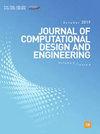风电热电联产经济动态调度问题的改进交叉差分进化算法
IF 6.1
2区 工程技术
Q1 COMPUTER SCIENCE, INTERDISCIPLINARY APPLICATIONS
引用次数: 0
摘要
针对风电热电联产动态经济调度问题,提出了一种改进交叉操作(ICRDE)的差分进化算法。首先,采用改进的交叉操作,利用原始个体、第一突变个体和第二突变个体保持种群多样性;其次,在变异运算中加入缩放因子和加权因子,提高算法的收敛效率;第三,引入自适应控制参数,平衡局部开采和全局勘探。此外,ICRDE的解在每一代被ICRDE的突变和交叉操作更新后,将使用约束处理方法对ICRDE的解进行进一步修正,提高了获得可行解的机会。实验结果表明,ICRDE对CEC2017基准函数、热电联产经济调度(CHPED)问题、有风电和无风电的热电联产经济调度问题具有较强的全局优化能力,优于对比算法。本文章由计算机程序翻译,如有差异,请以英文原文为准。
Differential evolution algorithm with improved crossover operation for combined heat and power economic dynamic dispatch problem with wind power
This paper proposes a differential evolution algorithm with improved crossover operation (ICRDE) to deal with combined heat and power dynamic economic dispatch (CHPDED) problems with wind power. First, the improved crossover operation is used to maintain the population diversity by using original individuals, first mutated individuals, and second mutated individuals. Second, the scaling factor and weighted factor are incorporated into the mutation operation to improve the convergence efficiency of the algorithm. Third, adaptive control parameters are introduced to balance local exploitation and global exploration. Moreover, after being updated by the mutation and crossover operation of ICRDE at each generation, the solutions of ICRDE will be further amended using a constraint handling method, which improves the chance of acquiring feasible solutions. Experimental results demonstrate that ICRDE has strong global optimization ability and surpasses the compared algorithms for the CEC2017 benchmark functions, the combined heat and power economic dispatch (CHPED) problems, and the CHPDED problem with and without wind power.
求助全文
通过发布文献求助,成功后即可免费获取论文全文。
去求助
来源期刊

Journal of Computational Design and Engineering
Computer Science-Human-Computer Interaction
CiteScore
7.70
自引率
20.40%
发文量
125
期刊介绍:
Journal of Computational Design and Engineering is an international journal that aims to provide academia and industry with a venue for rapid publication of research papers reporting innovative computational methods and applications to achieve a major breakthrough, practical improvements, and bold new research directions within a wide range of design and engineering:
• Theory and its progress in computational advancement for design and engineering
• Development of computational framework to support large scale design and engineering
• Interaction issues among human, designed artifacts, and systems
• Knowledge-intensive technologies for intelligent and sustainable systems
• Emerging technology and convergence of technology fields presented with convincing design examples
• Educational issues for academia, practitioners, and future generation
• Proposal on new research directions as well as survey and retrospectives on mature field.
 求助内容:
求助内容: 应助结果提醒方式:
应助结果提醒方式:


